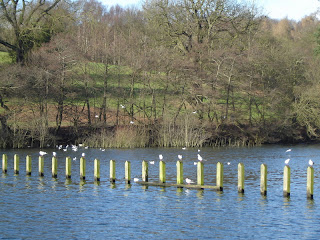Credit Me with This - - -
One was the man who lives in a cave near the top of a mountain in Tibet and hasn't spoken to anyone for fifteen years.
Twenty was the bloke who knocked on your door yesterday afternoon and asked if he could come in, meet all your relatives and do a tap dance in your living-room to show them all.
We did the test. Stephen, who is known as the Strong Silent Type - or, as Emily would put it "My Dad never speaks, don't worry about it" - scored eight. He may be quiet and fairly introverted but he's not particularly shy.
I scored three.
"Well, that's ridiculous," I hear you say. "Didn't you used to review the Sunday papers on Radio Leeds? Haven't you spoken to large groups of people? Weren't you a secondary-school teacher? What about all this acting you do for medical students?"
Yes, well. All those Daphnes weren't me - they were Daphne-with-strong-opinions or Daphne-who-can-spell or Daphne-who-knows-about-Communication-Skills.
As a child though, when I had to be ME, I found some things impossible.
It didn't help that, when the bloke above knocked on your door and announced that he was coming in to show you all his tap dance, my mother was two steps behind him and keen to join in.
For she is a sociable extrovert. Even the Communist is pretty extrovert, given the right circumstances.
They spent my childhood trying to do two things, especially when we were on holiday.
The first one was to Show Me Off and the second one was to find me a Little Friend to Play With.
So, on holiday in Italy, when I was five and had learned some Italian, it would be,
"Daphne speaks Italian. Daphne, speak Italian to the nice lady."
Daphne was now totally unable to say anything at all. She just stood there and waited for it to be over. If there had been a handy cliff, she would have jumped and thought it a merciful relief.
The Communist was still doing this to me in restaurants right until he was taken into hospital last June. How stupid to still feel the same at my age! But I did, and although I'm incredibly sad that he can't go to restaurants any more, I am so grateful that this no longer happens.
Of course, my loving parents meant no harm by it. They meant no harm by their continual attempts to get me to go to play with other children, instead of letting me read my book. They meant no harm by trying to get me to go up on stage at the pantomime. They meant no harm by making me go to many, many children's parties. More recently, they meant no harm by pulling me physically up onto the dance floor. In fact, they meant only good: they just didn't realise - still don't, really - that I'm not like them.
I've made use of these feelings of fear and impossibility to help with my roleplay for medical professionals and with teaching Communication Skills. I'm a good reader of body language. I tend to have a pretty good idea of who will get on with whom and who won't, and who'll be happy doing something and who won't.
Emily's an introvert too and I've just asked her if I've ever pushed her - or tried to push her - into any social situation that she didn't want to be in.
"Of course not," she said.
Yes, there are many things that I don't know about, but I think I know how to make people feel comfortable, and how to avoid making them feel uncomfortable. You can trust me on this, at least.


















